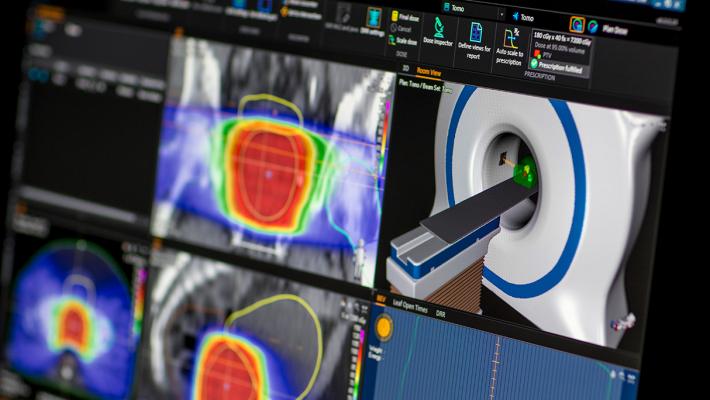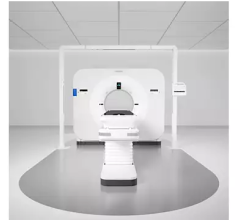
Treatment planning systems are at the heart of radiation therapy (RT) systems and the key to improved patient outcomes. Once images are loaded and the tumors identified, the systems develop a complex plan for each beam line route for how the therapy system will deliver radiation. The software also computes the expected dose distribution in the patient’s tissue, including variables such as tissue energy level penetration, which is influenced by the type of tissue the beam lines encounter. These systems also help navigate beam placement based on avoiding critical structures that are more sensitive to radiation in an effort to reduce collateral damage from the therapy. This may include automated, complex programming for multi-leaf collimator (MLC) leaf sequencing to shape the beam around critical structures during dose delivery. These treatment plans can also be modified to compensate for the reduction in tumor size over the course of treatments.
This article offers a brief overview of some of the newest software available on the treatment planning systems market.
Brainlab
In April, Brainlab announced the implementation of a software solution that can achieve better radiation therapy dose conformity around brain tumors, resulting from a close strategic collaboration with Elekta. Brainlab Elements take advantage of the specific properties of Elekta’s Agility multileaf collimator and compensates for the width of selected leaves, enabling the radiation beam to more accurately conform to the tumor’s shape, thereby minimizing dose to organs at risk. A new treatment planning algorithm in Brainlab Elements cranial radiosurgery software supports virtual leaf width capability with Agility on the Versa HD linear accelerator. Through the manipulation of the Y-Jaws, the algorithm partially blocks the collimator leaves along the vertical edge of a tumor target, which can reduce the collimator leaf down to 1 mm across the full treatment field of view for enhanced conformity.
Elekta also has an ongoing interoperability program with Brainlab that will ensure integration of ExacTrac 5.x and 6.x as well as future versions. The new enhanced capability supporting VersaHD builds on the success of existing collaborations between Elekta and Brainlab, like the jointly marketed Leksell Vantage Stereotactic System with Elements Stereotaxy, as well as the integration of Versa HD and Brainlab ExacTrac patient positioning and monitoring technology.
Elekta
Elekta recently announced it is making a strategic investment in PalabraApps LLC to advance the development of Elekta’s clinical workflow productivity and mobility tools. Tools developed through this investment will provide customers with solutions that are fully integrated with Elekta’s Mosaiq oncology information system (OIS) to address the growing need for enhanced clinical efficiency and quality control. This investment extends the collaboration that the companies announced in December 2017 to offer what they call the industry’s only voice-enabled electronic health record (EHR). With this investment, PalabraApps will develop a set of mobility tools that will be available as add-ons for existing Mosaiq customers and will be included as part of bundled solutions offerings for new customers.
Varian
Varian announced a new version of its Velocity cancer imaging software that includes Rapidsphere, a module for Y90 selective internal radiation therapy (SIRT) dosimetry analysis. Rapidsphere provides the ability for cancer care teams to better understand tumor response and normal-tissue toxicity for individual patients receiving SIRT. This new software module extends Varian’s Velocity software to interventional radiologists for use in targeted cancer therapy delivery to patients with liver malignancies. Velocity 4.0 and the Rapidsphere module have received U.S. Food and Drug Administration (FDA) 510(k) clearance.
Mirada Medical
U.K.-based medical imaging software provider Mirada Medical released DLCExpert software for automatic contouring of computed tomography (CT) scans based on next-generation deep learning contouring (DLC).
DLCExpert is Mirada’s first artificial intelligence (AI)-based clinical application. It is intended to automate the time-consuming clinical task of contouring for treatment planning and bring quality and consistency to this process. The software will reduce the time from initial patient consult to start of treatment. High-quality and consistently defined structures will allow more confidence when delivering treatment plans.
RaySearch
In February, The University of Texas MD Anderson Cancer Center and RaySearch Laboratories announced a new strategic alliance with the aim of enhancing cancer radiation therapy through several initiatives. The partnership will focus on goals including more precisely targeting tumors and improving upon, and making more available, adaptive radiation therapy (ART). This technology is currently only used at highly specialized
care centers.
Successful radiation therapy depends on the ability to delineate the precise tumor location. Since most radiation treatments are delivered over several weeks, a number of variables can compromise treatment accuracy. Traditionally, additional margins are set around the target area to allow for tumor movement and variations in how patients are positioned during treatment. However, these margins do not always compensate for unexpected changes in the tumor and surrounding normal tissue over the full course of radiation treatment. ART uses frequent imaging to give an up-to-date assessment of physical changes and enable precisely tailored treatment for each patient. The partnership, which builds upon a previously established relationship between RaySearch and MD Anderson centered on RayCare, RaySearch’s new oncology information system (OIS), combines MD Anderson’s clinical data and expertise with the latest technology and platforms available through RaySearch.
“The technology to perform adaptive radiation therapy has been around for a number of years and studies have demonstrated its advantages,” said Caroline Chung, M.D., assistant professor of radiation oncology at MD Anderson. “However, it is a complex process that has not yet been broadly adopted in clinical practice and is largely limited to highly specialized care centers. The goal of this collaboration is to establish a methodology and workflow, clinically tested at MD Anderson, which can be streamlined and automated to enable adaptive radiation therapy on a larger scale.”
The combination of advanced imaging data, including platforms such as RayCare and the treatment planning system RayStation, will be vital to improving the delineation of tumors. Together, this provides a novel opportunity for more personalized treatment, and the development of digital workflows has the potential to improve patient care at MD Anderson and other cancer care facilities around the world.


 May 15, 2025
May 15, 2025 








